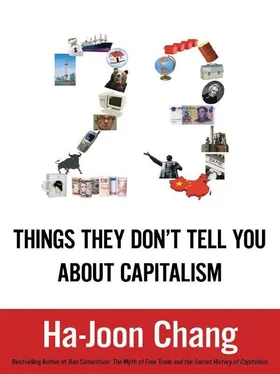What is driving this is the dramatic fall in job security over the last decade or so. After the 1997 financial crisis that ended the country’s ‘miracle years’, Korea abandoned its interventionist, paternalistic economic system and embraced market liberalism that emphasizes maximum competition. Job security has been drastically reduced in the name of greater labour market flexibility. Millions of workers have been forced into temporary jobs. Ironically enough, even before the crisis, the country had one of the most flexible labour markets in the rich world, with one of the highest ratios of workers without a permanent contract at around 50 per cent. The recent liberalization has pushed the ratio up even higher – to around 60 per cent. Moreover, even those with permanent contracts now suffer from heightened job insecurity. Before the 1997 crisis, most workers with a permanent contract could expect, de facto if not de jure , lifetime employment (as many of their Japanese counterparts still do). Not any more. Now older workers in their forties and fifties, even if they have a permanent contract, are encouraged to make way for the younger generation at the earliest possible chance. Companies cannot fire them at will, but we all know that there are ways to let people know that they are not wanted and thus to make them ‘voluntarily’ leave.
Given this, Korean youngsters are, understandably, playing safe. If they become a scientist or an engineer, they reckon, there is a high chance that they will be out of their jobs in their forties, even if they join major companies like Samsung or Hyundai. This is a horrendous prospect, since the welfare state in Korea is so weak – the smallest among the rich countries (measured by public social spending as a share of GDP). [66] OECD is the Organization for Economic Cooperation and Development. It is the club of the rich countries, with several members describing whom as ‘rich’ may be debatable, such as Portugal, Korea, Czech Republic, Hungary, Slovak Republic, Poland, Mexico and Turkey (in descending order of per capita income). Of these, Portugal and Korea are the richest, with around $18,000 per capita income (in 2006), and Turkey the poorest, with per capita income of $5,400 (in 2006). The next poorest OECD member after Portugal and Korea is Greece, which has a per capita income over $24,000. In 2003 (the latest year for which the OECD has the data), public social spending accounted for 5.7 per cent of GDP in Korea. The highest was Sweden, with 31.3 per cent. The OECD average was 20.7 per cent. See OECD Factbook 2008: Economic, Environmental and Social Statistics .
A weak welfare state was not such a big problem before, because many people had lifetime employment. With lifetime employment gone, it has become lethal. Once you lose your job, your living standard falls dramatically and, more importantly, you don’t have much of a second chance. Thus, bright Korean youngsters figure, and are advised by their parents, that with a licence to practise medicine they can work until they choose to retire. If the worst comes to the worst, they can set up their own clinics, even if they do not make much money (well, for a medical doctor). No wonder every Korean kid with a brain wants to study medicine (or law – another profession with a licence – if they are in the humanities stream).
Don’t get me wrong. I revere medical doctors. I owe my life to them – I have had a couple of life-saving operations and been cured of countless infections thanks to antibiotics they have prescribed for me. But even I know that it is impossible for 80 per cent of the brainiest Korean kids in the science stream all to be cut out to be medical doctors.
So, one of the freest labour markets in the rich world, that is, the Korean labour market, is spectacularly failing to allocate talent in the most efficient manner. The reason? Heightened job insecurity.
The welfare state is the bankruptcy law for workers
Job security is a thorny issue. Free-market economists believe that any labour market regulation that makes firing more difficult makes the economy less efficient and dynamic. To start with, it weakens the incentive for workers to work hard. On top of that, it discourages wealth creation by making employers more reluctant to hire additional people (for fear of not being able to fire them when necessary).
Labour market regulations are bad enough, it is argued, but the welfare state has made things even worse. By providing unemployment benefits, health insurance, free education and even minimum income support, the welfare state has effectively given everyone a guarantee to be hired by the government – as an ‘unemployed worker’, if you like – with a minimum wage. Therefore, workers do not have enough incentive to work hard. To make things worse, these welfare states are financed by taxing the rich, reducing their incentives to work hard, create jobs and generate wealth.
Given this, the reasoning goes, a country with a bigger welfare state is going to be less dynamic – its workers are less compelled to work, while its entrepreneurs are less motivated to create wealth.
This argument has been very influential. In the 1970s, a popular explanation of Britain’s then lacklustre economic performance was that its welfare state had become bloated and its trade unions overly powerful (which is also partly due to the welfare state, insofar as the latter dulls the threat of unemployment). In this reading of British history, Margaret Thatcher saved Britain by putting unions in their place and reducing the welfare state, even though what actually happened is more complicated. Since the 1990s, this view of the welfare state has become even more popular with the (allegedly) superior growth performance of the US to those of other rich countries with bigger welfare states. [67] In 2003 (the latest year for which the OECD has the data), public social spending accounted for 16.2 per cent of GDP in the US, compared to the OECD average of 20.7 per cent and the EU15 average of 23.9 per cent. Among the OECD member states, only Korea (5.7 per cent) and Mexico (6.8 per cent) – two countries that are usually not considered fully developed – had a lower ratio. Ibid.
When governments in other countries try to cut their welfare spending, they frequently cite Mrs Thatcher’s curing of the so-called ‘British Disease’ or the superior dynamism of the US economy.
But is it true that greater job security and a bigger welfare state make an economy less productive and dynamic?
As in our Korean example, a lack of job security can lead youngsters to make conservative choices with their career, favouring secure jobs in medicine or the law. This may be the right choice for them individually, but it leads to a misallocation of talents and thus reduces economic efficiency and dynamism.
The weaker welfare state in the US has been one important reason why trade protectionism is much stronger there than in Europe, despite a greater acceptance of government intervention in the latter. In Europe (of course, I am ignoring national differences in the details), if your industry declines and you lose your job, it is a big blow but not the end of the world. You will still keep your health insurance and public housing (or housing subsidies), while receiving unemployment benefits (up to 80 per cent of your last pay), government-subsidized retraining and government help in your job search. In contrast, if you are a worker in the US, you’d better make sure you hold on to your current job, if necessary through protectionism, because losing your job means losing almost everything. Unemployment insurance coverage is patchy and of shorter duration than in Europe. There is little public help with retraining and job search. More frighteningly, losing your job means losing your health insurance and probably your home, as there is little public housing or public subsidies for your rent. As a result, worker resistance to any industrial restructuring that involves job cuts is much greater in the US than in Europe. Most US workers are unable to put up an organized resistance, but those who can – unionized workers – will, understandably, do everything they can to preserve the current job distribution.
Читать дальше






![Ally Carter - [Gallagher Girls 01] I'd Tell You I Love You But Then I'd Have to Kill You](/books/262179/ally-carter-gallagher-girls-01-i-d-tell-you-i-lo-thumb.webp)





